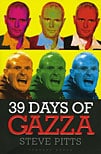 by Steve Pitts
by Steve Pitts
Pennant Books, £9.99
Reviewed by Pete Green
From WSC 276 February 2010
As with Pete Doherty, Kerry Katona and Amy Winehouse, so with Paul Gascoigne: the same hypocritical combination of moral outrage and rubber-necking guarantees sales each time their descent lights up the front pages. From the national institution status of 1990, of course, Gazza had further to fall than anyone – all the way to Kettering Town, where he fetched up in 2005, installed as celebrity manager by incoming 20-something chairman Imraan Ladak and sacked eight games later, accused of almost daily indiscretions as the drinking continued.
Local journalist Steve Pitts was well placed to bring us the exhilaration and bemusement that gripped the Northamptonshire club, from the starstruck mob that descended on Gascoigne’s first appearance in a local pub to the marketing of “I scored at Rockingham Road” knickers (£3 a pair). But is there more to set 39 Days of Gazza apart from the other 67 Gascoigne books currently showing up on an Amazon search?
Bemoaning the big-time pro’s straight-bat stance against the media, Pitts notes “no correlation” between journalists’ questions and the answers given by Gascoigne, who responded to an FA Cup defeat with “the cliche about concentrating on the league”. But the author has a similar tendency towards hackneyed phrasing: a retiring player is “hanging up his boots”, while Kettering is not “a hotbed of football fever”. This text looks carefully pitched to be accessible to readers of the same newspapers whose hounding it implicates in Gascoigne’s decline – in both its undemanding style and its large type.
There’s no tabloid prurience here though. Pitts retains a sense of decency and empathy throughout, and is especially astute in pointing out the frustration and sheer boredom that Gascoigne must have felt, keen to crack on with the job but able to work with his part-time players for only a few hours a week. Managing a full-time club, suggests the author, he might have been able to immerse himself more fully in the work and stay off the drink, but all that time on his hands might have been the decisive factor in Gascoigne’s downfall at Rockingham Road.
But this is a bitty and jumbled account, and while we already know the outcome, we’re still left feeling disorientated and vaguely cheated by the strange sequence in which information and events are narrated (and sometimes repeated). As Ladak’s takeover progresses, Gascoigne is initially absent from the club “out of respect for Kevin Wilson”; only in the next chapter do we learn that Wilson was Town’s existing manager. Chapter seven covers a Cup defeat at home to Stevenage and explores its aftermath; chapter eight covers it again. After Gascoigne’s sacking there are 80-odd pages of the book left, in which some of the players we met earlier look back over his reign and tell us how they got on afterwards: a sort of extended epilogue which achieves little other than making sure all of Pitts’s interview material gets used up.
These 39 days, finally, constitute a sad chapter in a sadder story which we’ll never start to understand without a longer and broader perspective. “I just wonder why we as a nation have this celebrity cult thing. He’s just a flawed man who could play football,” reflects former Poppies director Dave Dunham. I wonder why as well. It certainly sells books though.